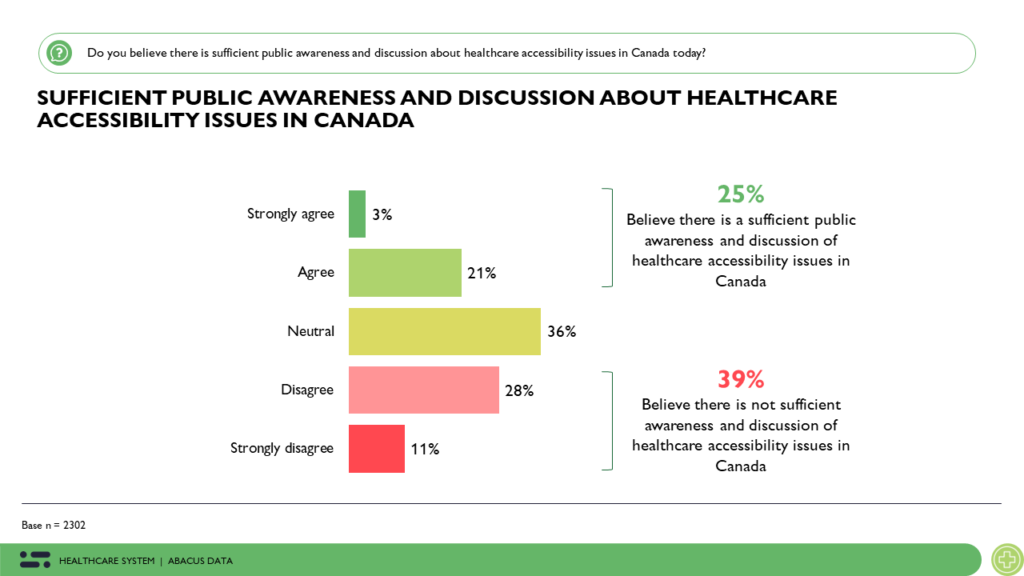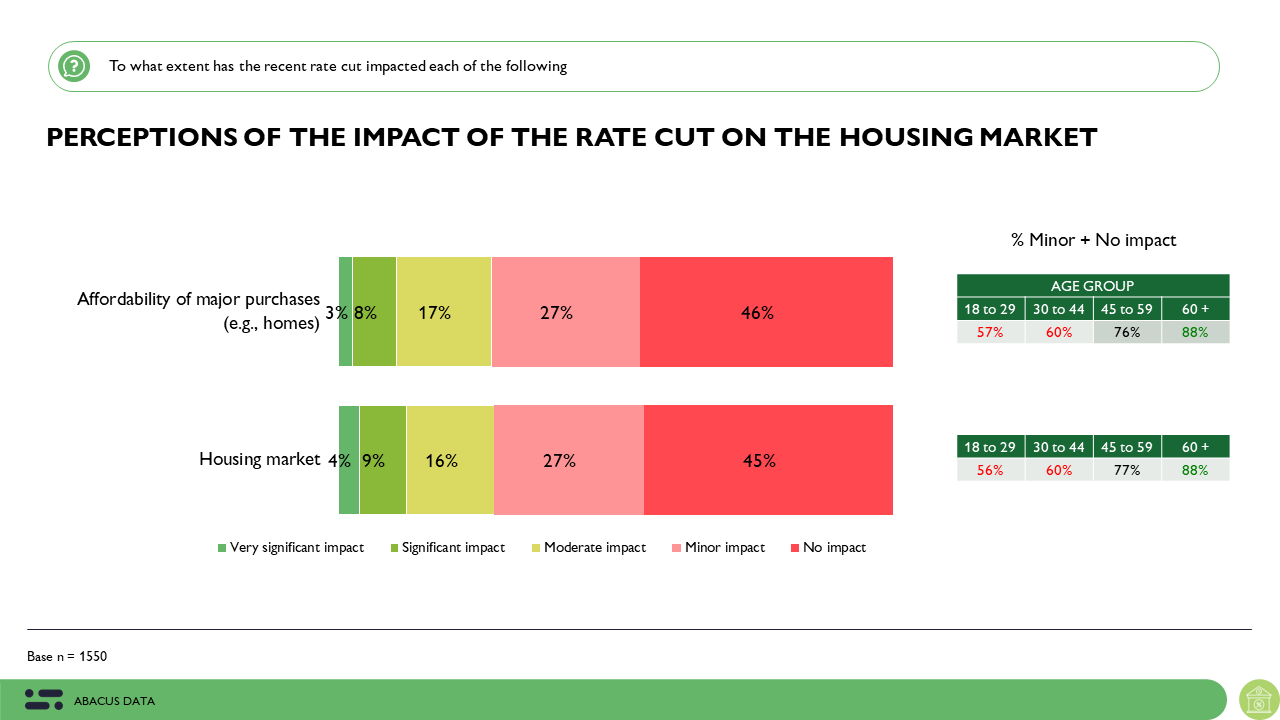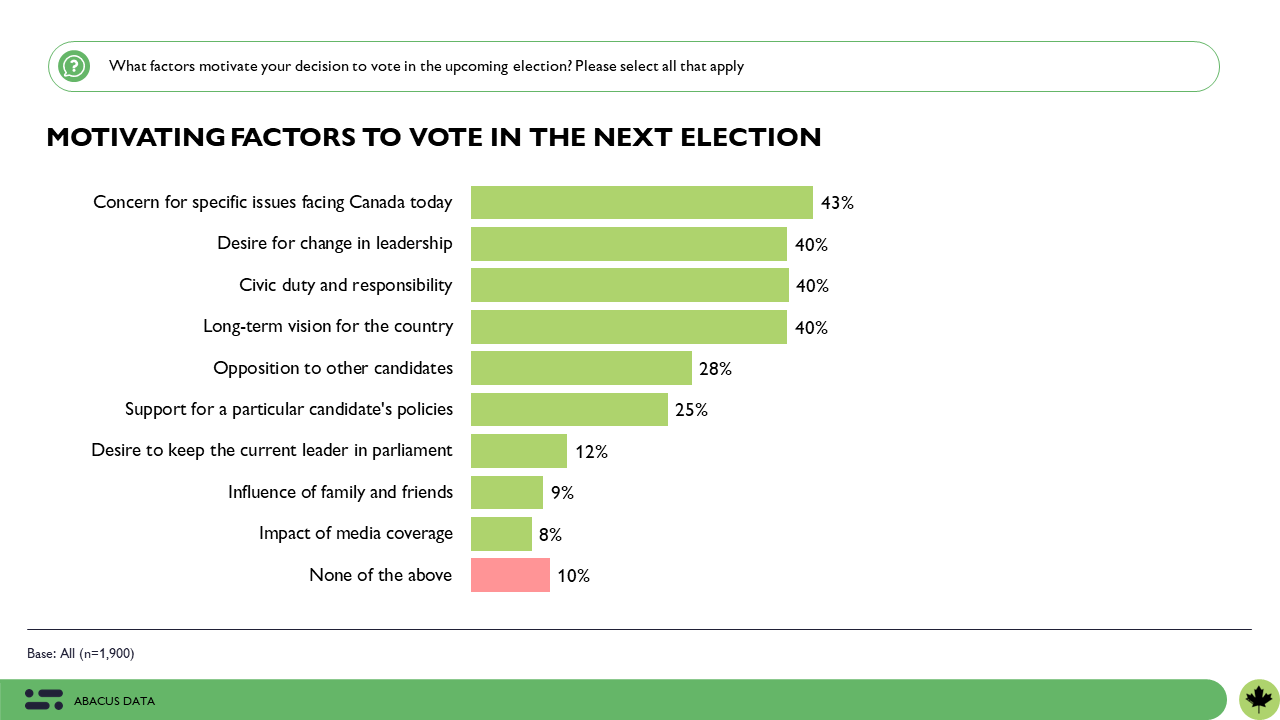Bridging the Gap: Addressing Healthcare Confidence and Accessibility in Canada
April 25, 2024
From April 11 to 16, 2024, Abacus Data conducted a nationwide survey involving 2,302 Canadians aged 18 and above to explore their sentiments regarding the Canadian healthcare system, particularly their confidence in accessing healthcare when necessary. The findings from this study underscore a mounting apprehension among Canadians regarding the accessibility of our healthcare system, particularly given the rapid growth and aging of the Canadian population. The concern over future access to healthcare is increasingly prevalent among many Canadians and is a matter that cannot go overlooked.
This article marks the beginning of our forthcoming series dedicated to health and wellness in Canada, serving as Part 1 of our in-depth exploration. Commencing in May, our team will embark on a thorough investigation into the landscape of health and wellness across the country, delving into the topics that hold the greatest significance for Canadians. Through this comprehensive examination, we aim to shed light on the pressing concerns and priorities within the realm of health and wellness.
Satisfaction with the Healthcare System
One-third of Canadians rate their provincial healthcare system as poor (35%), while two-fifths consider it good (39%). Ontarians are notably more positive, with 44% rating their system positively, in contrast to Atlantic Canada where 52% view it negatively. Those planning to vote Liberal in the next federal election are more likely to rate their healthcare system as good (52%), as are those who think the country is on the right track (58%)


Concerns with Accessibility of Healthcare Services
In general, Canadians have varying perspectives on the availability of healthcare services in their provinces. Specifically, 33% express contentment with the current accessibility of healthcare services, while 39% indicate dissatisfaction. Notably, residents of Atlantic Canada are notably more likely to be dissatisfied (57%), while Ontarians report the highest satisfaction levels (37%).
Politically, individuals intending to support the Liberal party in the upcoming federal election exhibit the highest satisfaction levels with healthcare access (47%), whereas those voting for the NDP show lower satisfaction levels (25%). Lastly, residents in rural areas display the highest dissatisfaction levels, with 47% expressing discontent with healthcare access in their regions.


Confidence in Canada’s Healthcare System
In general, one-third of Canadians express confidence in our healthcare system today (35%). Confidence is lowest among those who live in Atlantic Canada (19% agree), and those who intend to vote for the Conservative party in the next federal election (30% agree). Conversely, those planning to support the Liberal Party in the next federal election show a notably higher level of confidence in Canada’s healthcare system (50%) as well as individuals who believe Canada is on the right track are significantly (57%).
When considering the role of government, only 30% of Canadians believe their provincial government prioritizes healthcare funding and resources, while 27% perceive the federal government as prioritizing healthcare funding. Residents in Atlantic Canada are significantly less likely to believe that the federal government (17% agree) and their provincial government (21% agree) prioritize healthcare funding. Nationally, Liberal party supporters are markedly more likely to trust the federal government’s prioritization of healthcare funding (44%) than Conservative party supporters (21%).

Concerns about Future Healthcare Access in Canada
Access to healthcare is a pressing concern for many Canadians, particularly regarding future accessibility. A substantial 52% express significant worry, with a staggering 96% expressing some level of concern. This worry is particularly pronounced among older Canadians, with 59% of those 60 and above expressing extreme concern. Additionally, residents of Atlantic Canada are notably worried, with 65% indicating concerns about future healthcare access.

Healthcare Accessibility Amidst Demographic Shifts
Concerns about the future accessibility of healthcare services in Canada are exacerbated by a widespread lack of confidence in the healthcare system’s ability to adapt to an aging and expanding population. Shockingly, less than 1 in 10 Canadians express confidence in the system’s capacity to meet these evolving needs, with a staggering 31% indicating they have no confidence at all.
Across the country, those who live in Atlantic Canada express the lowest levels of confidence, with 45% noting that they are not confident in the ability of the healthcare system to meet the needs of a changing population. Politically, there’s a noticeable divergence in confidence levels. Those intending to vote for the Conservative party in the upcoming federal election are substantially more likely to express doubts, with 38% indicating a lack of confidence, compared to only 17% among those intending to vote for the Liberal party.

Navigating Canada’s Healthcare Challenges
Within Canada’s healthcare system, numerous pressing challenges require immediate attention. A significant 58% of Canadians highlight workforce shortages as a critical issue, closely followed by excessive wait times, identified by 57% of the population. Additionally, concerns about the aging population prominently rank, with 35% of citizens recognizing it as a major challenge, alongside 34% acknowledging the impact of a rapidly growing population.
Overall, these results underscore the multifaceted nature of healthcare challenges in Canada, highlighting the urgent need for comprehensive strategies to address workforce shortages, reduce wait times, and effectively manage the implications of demographic shifts.

Addressing the Awareness Gap: Public Discourse on Healthcare Accessibility in Canada
Amidst growing concerns about healthcare accessibility, exacerbated by demographic shifts, 40% of Canadians perceive a lack of public awareness and discussion on this critical issue. This concern has escalated alongside record levels of immigration and changing demographics. However, many Canadians feel that healthcare accessibility remains underrepresented in public discourse.
The insufficient attention to healthcare accessibility underscores the urgent need for increased awareness and proactive measures to meet Canada’s evolving healthcare needs. Ignoring these concerns risks compromising the effectiveness and inclusivity of the healthcare system.

THE UPSHOT
The latest findings underscore a strong concern among Canadians regarding the future of our healthcare system, accompanied by a perception of inadequate public discourse on this vital issue. This mounting concern coincides with record levels of immigration and shifting demographics, yet healthcare accessibility remains conspicuously absent from public conversations.
When we examine the top concerns of Canadians, healthcare consistently ranks among the top three, trailing only behind the pressing issues of the cost of living and housing affordability. This underscores its paramount importance to Canadians today. Access challenges in healthcare, whether manifested through appointment difficulties, procedural delays, or prolonged emergency room wait times, loom large in the minds of Canadians.
While government discourse often centers on affordability and the broader cost of living, the challenges within healthcare have regrettably been sidelined in recent political discourse, notably in the recently released federal budget.
Canada’s unprecedented growth and aging population contribute to a sense of scarcity, wherein Canadians contend with constrained access to resources, including healthcare, that were previously taken for granted. The perceived lack of attention to healthcare accessibility highlights an urgent need for heightened awareness and proactive measures to address Canada’s evolving healthcare landscape. Failure to address these concerns may impact the effectiveness and inclusivity of our healthcare system.
Methodology
The survey was conducted with 2,302 Canadian adults from April 11 to 16, 2024. A random sample of panelists were invited to complete the survey from a set of partner panels based on the Lucid exchange platform. These partners are typically double opt-in survey panels, blended to manage out potential skews in the data from a single source.
The margin of error for a comparable probability-based random sample of the same size is +/-2.04%, 19 times out of 20.
The data were weighted according to census data to ensure that the sample matched Canada’s population according to age, gender, educational attainment, and region.
This survey was paid for by Abacus Data Inc.
Abacus Data follows the CRIC Public Opinion Research Standards and Disclosure Requirements that can be found here: https://canadianresearchinsightscouncil.ca/standards/
About Abacus Data
We are the only research and strategy firm that helps organizations respond to the disruptive risks and opportunities in a world where demographics and technology are changing more quickly than ever.
We are an innovative, fast-growing public opinion and marketing research consultancy. We use the latest technology, sound science, and deep experience to generate top-flight research-based advice to our clients. We offer global research capacity with a strong focus on customer service, attention to detail, and exceptional value.
We were one of the most accurate pollsters conducting research during the 2021 Canadian election following up on our outstanding record in 2019. Find out more about how we can help your organization by downloading our corporate profile and service offering.




